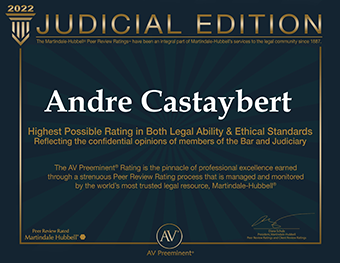Why Choose to Resolve Commercial Disputes in New York
Category: Business Transactions | Business and Employment Litigation | Commercial Litigation | Commercial Litigation and Arbitration
A HIGHLY REGARDED BODY OF CONTRACT LAW
- New York offers a well-established body of law providing a reliable platform for commercial transactions and adjudicating business disputes.
- The parties have few limits on structuring their contractual relationships and allocating risks.
- There is a strong public policy in favor of arbitration, favored by both federal and state courts, eliminating hurdles in enforcing arbitration agreements.
- Commercial parties may agree to waive certain procedural laws and practices such as a right to a jury trial.
- New York law has an established principle of a duty of good faith and fair dealing in contractual relationships. The parties’ expectation is an element considered by the courts in making a decision.
EXPERIENCED COURTS AND ARBITRATORS
- New York Judges and arbitrators frequently decide cross-border disputes and have gained broad experience applying New York law in different commercial contexts. The New York State’s Commercial Division and arbitrators are well equipped to handle international and domestic commercial cases.
- New York also has a wide selection of attorneys and law firms that specialize in resolving commercial disputes that are familiar with cross-cultural perspectives and industry practices and customs.
INTERNATIONAL AND INTERSTATE DISPUTES
- The United States is a party to major international treaties and free trade agreements. New York courts apply widely accepted international arbitration standards in cross-border arbitrations.
- New York’s courts permit consideration of international customs and practices in cross-border disputes, and legislations tend to implement international trade customs.
- New York’s public policy and judicial decisions articulate and establish commercial principles and specialized jurisprudence in fields such as banking and finance, cross-border transactions, and long-term exclusive dealings contracts.
- Foreign corporations have few limits on commencing legal proceedings in New York’s courts, so long as the forum is not considered to be inconvenient for the parties. In cases where the parties have agreed to the application of New York law and where the amount in controversy meets the threshold, New York will provide a forum to the foreign party.
REALIABLE AND PROMPT ENFORCEMENT
- In accordance with various international conventions to which the United States is a party, commercial arbitral awards issued in any of the countries that ratified the agreement may be enforced in the United States. New York courts enforce foreign arbitral awards under conventions that bind the United States as a party.
- New York has enacted laws such as a version of the Uniform Foreign Country Money-Judgments Recognition Act requiring New York courts to recognize and enforce monetary judgments of foreign courts with certain exceptions, thereby facilitating the enforcement of foreign judgments.
- New York arbitral awards and court judgments granting declaratory, injunctive, or compensatory relief are widely enforceable outside the United States.
DAMAGES AND REMEDIES
- Parties may provide for allocation of attorneys’ fees in connection with the litigation or arbitration of contractual disputes.
- Court-ordered provisional remedies such as attachment, preliminary injunction, and receivership are available when warranted. New York law provides for attachment and injunction in domestic and international arbitrations.
- New York courts generally uphold contractual provisions limiting damages or excluding indirect damages.
PROTECTION OF COMMERCIAL INTERESTS
- New York law protects security interests by upholding security agreements against collateral purchasers and creditors.
- New York recognizes and protects third-party beneficiary rights by allowing third-party claims under specified circumstances.
To learn more about how CASTAYBERT PLLC can assist you in arbitrations, click here.









